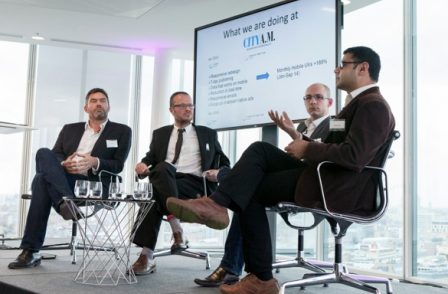
“Eighty per cent of mobile time is spent on apps.” It is a statistic I’ve heard quoted more than once over the last week. It’s been used to make the case for news-based mobile and tablet apps; evidence of a reader predilection for apps over websites. In truth, it tells us no such thing.
The figure comes from Flurry (the Google Analytics for apps) and it dates from early last year. The percentage itself isn’t wrong but once you dig into it you realise that most of that app-time is spent on games, social networks, utilities and tools – not news. According to the Flurry numbers, just 2 per cent of mobile time is spent on news-based apps.
More instructive is this pie chart from the Guardian, first shown at last week’s News on the Move Conference, convened by the Press Gazette and hosted by News UK.

The chart comes with a health warning – it is a snapshot of one weekend’s activity, not audited figures. Nevertheless, it is indicative of the Guardian’s overall experience. For example, it reflects the fact that 20 per cent of the title’s page views are triggered by the mobile app. This figure is impressive on a number of levels. The Guardian only relaunched its mobile and tablet apps in May, the absolute page views are high and they are doubtless higher than the newspaper industry average.
Yet, set against another benchmark the numbers look less impressive. Yes, one in five page views come via the app but, as the pie chart shows, twice as much traffic comes from mobile and tablet users accessing the Guardian website. It’s the website not the app that’s more popular among mobile users.
All of which begs a few questions:
– Why build a mobile app when a responsive website, well designed in HTML5, renders perfectly regardless of operating system, device type or size?
– Why build an app that will need updating every time Apple and Google release new versions of their iOS and Android operating systems and manufacturers bring out devices with different form factors?
– And, why embark on a project that’s going to involve significant capital and operational expense when figures suggest that mobile users are more inclined to visit web pages?
Subhajit Banerjee, mobile editor at Guardian News & Media, acknowledges the app challenge. “There are a number of studies that show that users are downloading less apps and they are not even opening the ones that they have downloaded,” he told the News on the Move audience.
However, he went on to point out a number of app benefits, including:
1. User personalisation. Enabling the reader to tailor the reading experience to his or her own tastes and subject preferences.
2. Publisher personalisation. Algorithmically serving up related content, based on user behaviour, encouraging readers to stay longer.
3. Push notifications. Used to alert readers to new editions, breaking news and special offers; prompting return visits.
4. An additional revenue stream. Banerjee calls the Guardian app “a graduation product.” In other words, you can upsell regular and loyal web users to it and, ultimately, charge a premium. The Guardian app, for example, costs £2.49 per month for the premium version which features an interactive crossword, personalisation and book extracts.
In the ledger of benefits, you might add:
5. Increased dwell time. Alan Hunter, head of digital for The Times and The Sunday Times says readers spend an average of 40 minutes a day reading the tablet version of his weekly title and nearly an hour reading his Sunday title. “That’s very much akin to what we see in print products,” Hunter said. It is also far higher than website dwell times.
6. Better engagement with advertising. News UK, publisher of The Times and The Sunday Times, claims its neuroscience research shows that tablet app adverts are just as effective as print-based equivalents despite the fact that readers spend a fraction of the time looking at the former compared to the latter.
Of those benefits, I’d suggest that user personalisation is, at best, marginal. After all, we employ editors for a reason. (It’s why Sky Sport’s PlayerCam was only ever a minority pursuit – few of us wanted to become vision mixers when slumped on our sofas.) I do buy the dwell time argument but remain sceptical about the levels of advertising engagement. I’d like to see the study that shows recall is the same for an ad that is flicked away in a second and an ad that sits on the same page as a piece that someone might spend minutes reading.
Still, among this list of benefits may lie the business case for building a new app. But user behaviour should make all publishers, especially those without deep pockets, think twice before embarking on their app adventure.
Martin Ashplant, digital and social media director at City AM, is thinking twice. As former head of digital at Metro.co.uk, his team built what he described a “brilliant … stylised newspaper app”. It was a product he was proud of but it proved to be resource-heavy (a team of ten worked on it each day) with limited audience growth (“no matter how good the app was, we couldn’t get it above a daily ceiling”). So at City AM he is offering a simple PDF version of the newspaper to complement a responsive-designed website. For now, the app can wait.
Picture top: Alan Hunter, Jon Bernstein, Martin Ashplant and Subharjit Banerjee at News on the Move, credit: Anne Koefoed.
Watch the full video of News on the Move III, in association with News UK:
Jon Bernstein is an independent digital media consultant and writer, formerly deputy editor then digital director of New Statesman and multimedia editor at Channel 4 News. He tweets @jon_bernstein
Email pged@pressgazette.co.uk to point out mistakes, provide story tips or send in a letter for publication on our "Letters Page" blog
